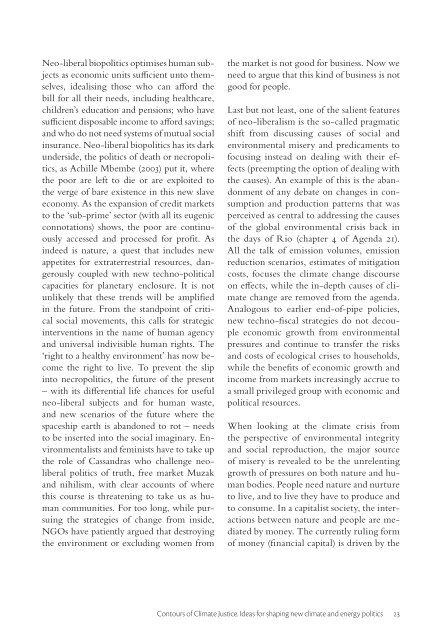Contours of Climate Justice - Dag Hammarskjöld Foundation
Contours of Climate Justice - Dag Hammarskjöld Foundation
Contours of Climate Justice - Dag Hammarskjöld Foundation
You also want an ePaper? Increase the reach of your titles
YUMPU automatically turns print PDFs into web optimized ePapers that Google loves.
Neo-liberal biopolitics optimises human subjects<br />
as economic units suffi cient unto themselves,<br />
idealising those who can aff ord the<br />
bill for all their needs, including healthcare,<br />
children’s education and pensions; who have<br />
suffi cient disposable income to aff ord savings;<br />
and who do not need systems <strong>of</strong> mutual social<br />
insurance. Neo-liberal biopolitics has its dark<br />
underside, the politics <strong>of</strong> death or necropolitics,<br />
as Achille Mbembe (2003) put it, where<br />
the poor are left to die or are exploited to<br />
the verge <strong>of</strong> bare existence in this new slave<br />
economy. As the expansion <strong>of</strong> credit markets<br />
to the ‘sub-prime’ sector (with all its eugenic<br />
connotations) shows, the poor are continuously<br />
accessed and processed for pr<strong>of</strong>i t. As<br />
indeed is nature, a quest that includes new<br />
appetites for extraterrestrial resources, dangerously<br />
coupled with new techno-political<br />
capacities for planetary enclosure. It is not<br />
unlikely that these trends will be amplifi ed<br />
in the future. From the standpoint <strong>of</strong> critical<br />
social movements, this calls for strategic<br />
interventions in the name <strong>of</strong> human agency<br />
and universal indivisible human rights. The<br />
‘right to a healthy environment’ has now become<br />
the right to live. To prevent the slip<br />
into necropolitics, the future <strong>of</strong> the present<br />
– with its diff erential life chances for useful<br />
neo-liberal subjects and for human waste,<br />
and new scenarios <strong>of</strong> the future where the<br />
spaceship earth is abandoned to rot – needs<br />
to be inserted into the social imaginary. Environmentalists<br />
and feminists have to take up<br />
the role <strong>of</strong> Cassandras who challenge neoliberal<br />
politics <strong>of</strong> truth, free market Muzak<br />
and nihilism, with clear accounts <strong>of</strong> where<br />
this course is threatening to take us as human<br />
communities. For too long, while pursuing<br />
the strategies <strong>of</strong> change from inside,<br />
NGOs have patiently argued that destroying<br />
the environment or excluding women from<br />
the market is not good for business. Now we<br />
need to argue that this kind <strong>of</strong> business is not<br />
good for people.<br />
Last but not least, one <strong>of</strong> the salient features<br />
<strong>of</strong> neo-liberalism is the so-called pragmatic<br />
shift from discussing causes <strong>of</strong> social and<br />
environmental misery and predicaments to<br />
focusing instead on dealing with their effects<br />
(preempting the option <strong>of</strong> dealing with<br />
the causes). An example <strong>of</strong> this is the abandonment<br />
<strong>of</strong> any debate on changes in consumption<br />
and production patterns that was<br />
perceived as central to addressing the causes<br />
<strong>of</strong> the global environmental crisis back in<br />
the days <strong>of</strong> Rio (chapter 4 <strong>of</strong> Agenda 21).<br />
All the talk <strong>of</strong> emission volumes, emission<br />
reduction scenarios, estimates <strong>of</strong> mitigation<br />
costs, focuses the climate change discourse<br />
on eff ects, while the in-depth causes <strong>of</strong> climate<br />
change are removed from the agenda.<br />
Analogous to earlier end-<strong>of</strong>-pipe policies,<br />
new techno-fi scal strategies do not decouple<br />
economic growth from environmental<br />
pressures and continue to transfer the risks<br />
and costs <strong>of</strong> ecological crises to households,<br />
while the benefi ts <strong>of</strong> economic growth and<br />
income from markets increasingly accrue to<br />
a small privileged group with economic and<br />
political resources.<br />
When looking at the climate crisis from<br />
the perspective <strong>of</strong> environmental integrity<br />
and social reproduction, the major source<br />
<strong>of</strong> misery is revealed to be the unrelenting<br />
growth <strong>of</strong> pressures on both nature and human<br />
bodies. People need nature and nurture<br />
to live, and to live they have to produce and<br />
to consume. In a capitalist society, the interactions<br />
between nature and people are mediated<br />
by money. The currently ruling form<br />
<strong>of</strong> money (fi nancial capital) is driven by the<br />
<strong>Contours</strong> <strong>of</strong> <strong>Climate</strong> <strong>Justice</strong>. Ideas for shaping new climate and energy politics 23
















